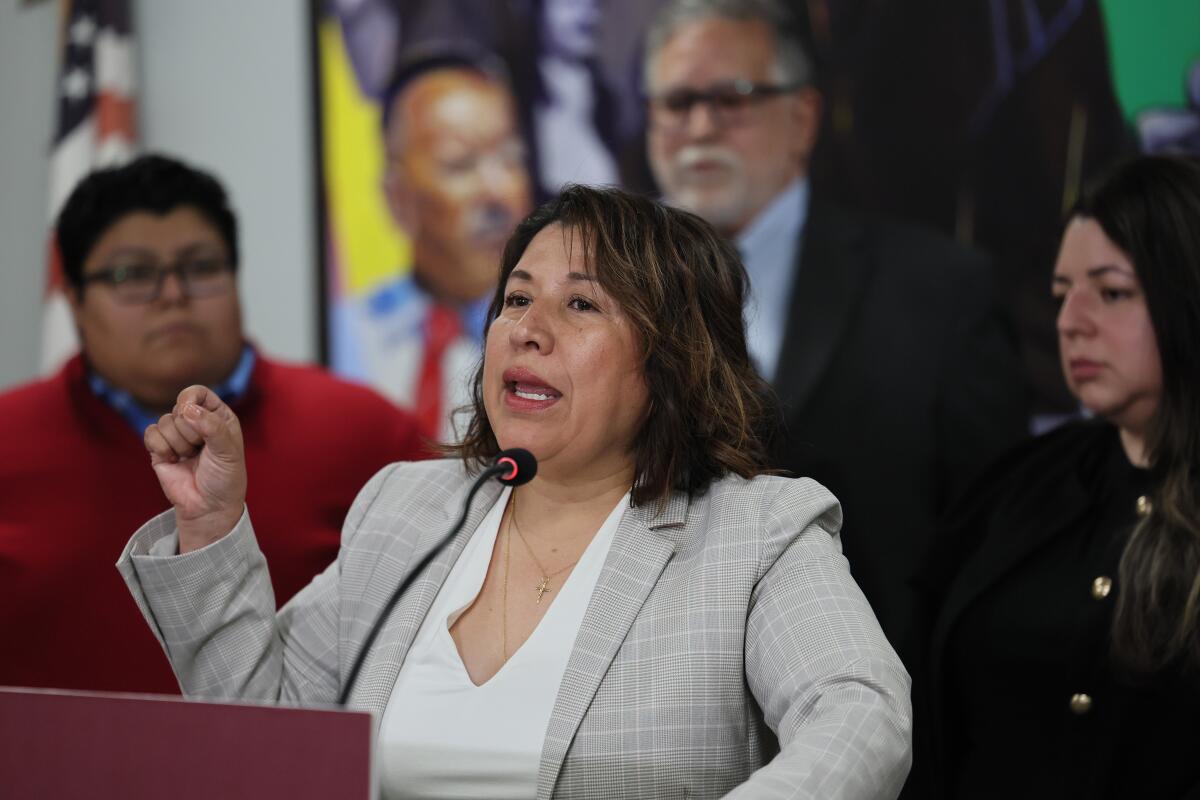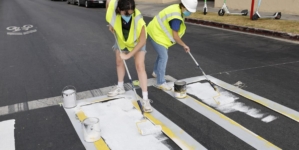-
Hulu and Disney+ will be combined into one app, Disney says - 3 mins ago
-
NY Giants Legend Surprises Jaxson Dart with Personal Note - 15 mins ago
-
Gypsy Orchestra Celebrates Anniversary with Gala Concert - 19 mins ago
-
Newsom vows Texas will be ‘neutered’ by California Will voters let him do it? - 24 mins ago
-
2025 FedEx St. Jude Championship Field: Full list of golfers for first leg of playoffs - 48 mins ago
-
Lake Balaton’s Top 10 Ice Cream Shops Revealed - 51 mins ago
-
Dodgers’ Mookie Betts Reveals Surprising Cause for Brutal Slump - 57 mins ago
-
Tired of waiting for the city, Angelenos paint their own crosswalks. Some become permanent. - about 1 hour ago
-
Claire’s, a jewelry retailer for teens, files for Chapter 11 bankruptcy - about 1 hour ago
-
Wheat Overtakes Corn as Hungary’s Top Crop - about 1 hour ago
Trump immigration team revives once-shelved deportation cases
A decade ago, Jesus Adan Rico breathed a big sigh of relief. That was when the Chino High School student, a Dreamer, learned an immigration judge had effectively shelved his deportation proceedings. Maria Torres, who came to the U.S. at 2 years old, also had her deportation proceedings paused by an immigration judge because she recently married a U.S. citizen.
Yet just eight weeks ago, Adan Rico — now 29, married with a new child — discovered that the Trump administration had revived his deportation case, even though he has renewed his DACA status at least four times. Torres learned the government wants to bring back her case just as she was preparing for her green card interview.
“No matter what we do, no matter how far we go in school, in our jobs and with our families, it doesn’t matter. It is all hanging by a thread,” he said.
Adan Rico and Torres are among thousands of immigrants who have built lives around the assumption they are safe from being detained and deported. Now they face that threat at the hands of the Department of Homeland Security, which is giving new life to administratively closed cases in a bid to step up immigration enforcement.
Some lawyers have received dozens of motions to recalendar — the first step to reopen old cases. If lawyers don’t succeed in opposing those motions, the immigrants could wind up back in courthouses that in recent months have become a hub for arrests.
“It has been 10 years,” Adan Rico said. “And all of a sudden our lives are on hold again, at the mercy of these people that think I have no right to be here.”
DHS Assistant Secretary for Public Affairs Tricia McLaughlin, flanked by Madison Sheahan, left, and Todd Lyons, speaks during a news conference at ICE headquarters in May.
(Jose Luis Magana / Associated Press)
When asked about the government’s push to restart old proceedings, Homeland Security spokesperson Tricia McLaughlin declined to address questions about the administration’s change in policy or respond to attorneys’ complaints about the process. She released a statement similar to others she has offered to the media on immigration inquiries.
“Biden chose to release millions of illegal aliens, including criminals, into the country and used prosecutorial discretion to indefinitely delay their cases and allow them to illegally remain in the United States,” she said. “Now, President Trump and Secretary Noem are following the law and resuming these illegal aliens’ removal proceedings and ensuring their cases are heard by a judge.”
Attorneys handling these proceedings say the government is overwhelming the courts and immigration lawyers by dredging up cases, many of which are a decade or more old. In several of these, clients or their original lawyers have died. In other cases, immigrants have received legal status and were surprised to learn the government was attempting to revive deportation proceedings against them.
Since the 1970s, immigration judges have administratively closed deportation proceedings in order to ease the massive backlog on their dockets and prioritize more urgent cases. The maneuver essentially deferred a case, but didn’t completely dismiss it, giving both the court and the immigrant wiggle room. The idea was that immigrants could pursue other forms of relief such as a hardship waiver or deferred status. The government could reopen the case if needed.
Across the country, immigration attorneys have received a flurry of requests by Homeland Security’s Office of Principal Legal Advisor to revive cases. The motions, attorneys say, appear similar in language, and lack analysis or reference to a change that prompted the decision. In their motions, Trump administration lawyers argue that the targeted immigrants have not been granted green cards and therefore do not have legal status to be here.
The motions urge immigration judges to use their discretion to revive cases and consider whether a person has been detained or the pending application’s “ultimate outcome or likelihood of success.”
What distinguishes immigration proceedings from cases in federal or state courts is that both the lawyers and the judges are part of the executive branch, not the judiciary branch. They answer to Secretary Kristi Noem and Atty. Gen. Pam Bondi, respectively.
Attorneys and clients are racing against the clock to submit opposition to these motions. Many have become in essence private investigators, tracking down clients they haven’t seen in years. Other attorneys, who have retired, are looking to other immigration attorneys to pick up their client’s case.
“The court is drowning in these motions because we’re trying to resist these,” said David L. Wilson, an immigration attorney at Wilson Law Group in Minneapolis. He first received a batch of 25 government motions at the end of May — and then they kept coming every few weeks. One case involved a client from El Salvador who had been granted Temporary Protected Status, and whose case was administratively closed in 2006.
Adan Rico, a new father who is studying to be an HVAC technician in the Inland Empire, was stunned that the government was seeking to revive deportation proceedings.
The attorney who originally represented him has since died. “If it wasn’t for his daughter calling, I would have never found out my case was reopened,” he said. “The Department of Homeland Security never sent me anything.”

Attorney Patricia M. Corrales speaks at the Coalition for Humane Immigrant Rights Los Angeles office in April.
(Allen J. Schaben / Los Angeles Times)
His new attorney, Patricia Corrales, said Adan Rico’s Deferred Action for Childhood Arrivals status doesn’t come up for renewal until 2027 and it defers deportation proceedings. But Corrales, who has received about a dozen motions, said it appears the government isn’t even checking whether the individuals are alive, much less their immigration status.
One of her cases is that of construction worker Helario Romero Arciniega. Seven years ago, a judge administratively closed deportation proceedings for Romero Arciniega, after he was severely beaten with a metal sprinkler head and had qualified for a visa for crime victims.
This year, government officials filed a motion to bring back the deportation proceedings against the construction worker, even though he had died six months ago.
“They don’t do their homework,” Corrales said of the government lawyers. “They’re very negligent in the manner in which they’re handling these motions to re-calendar.”
Some attorneys have reported delays in their ability to file their opposition motions because the court is so overwhelmed.
When asked about the backlog, Kathryn Mattingly, a spokesperson for the federal immigration court known as the Executive Office for Immigration Review, confirmed that the court “must receive the underlying initial motion before it can accept a response to that motion.”
Some immigrants now in legal limbo were just steps away from finalizing their green card applications.
Maria Torres, an L.A. County resident and mother of two, said she was only 2 years old when she was brought to the U.S. by her family. She grew up undocumented, and when the Deferred Action for Childhood Arrivals program became available, applied to gain work authorization.
But in 2019, at 21, she was arrested on suspicion of a misdemeanor DUI, which put her into deportation proceedings. She took the classes and paid her ticket. With deportation proceedings open against her, she was able to get her case closed in 2022 while she sought a visa through her husband, a U.S. citizen.
Her visa was approved, and with just one interview appointment left, Torres felt blindsided when she received a call from her attorney’s office, saying the government wanted to restart deportation proceedings against her.
“I just felt my heart sink and I started crying,” she said. Her attorney submitted a motion opposing the recalendaring of the case, and they are waiting to hear how a judge will rule. In the meantime, she said, she’s hopeful she’ll have her final interview for her approved visa before then.

“People aren’t getting due process,” said attorney Mariela Caravetta. “It’s very unfair to the client because these cases have been sleeping for 10 years.”
(Carlin Stiehl / Los Angeles Times)
Mariela Caravetta, an immigration attorney in Van Nuys, said that, since early June, about 30 of her clients have been targeted with government motions to reopen their cases.
By law, she has to reply in 10 days. That means she has to track down the client, who may have moved out of state.
“It’s bad faith doing it like that,” said Caravetta, who accused the federal government of flooding the immigration courts in an effort to meet its deportation quotas.
“People aren’t getting due process,” she said. “It’s very unfair to the client because these cases have been sleeping for 10 years.”
Caravetta has convinced some judges to deny the government motions because the clients are seeking ways to legally stay in the country. In a handful of cases, she hasn’t been able to reach her clients.
The government isn’t making an effort to reach out to attorneys to discuss the cases, as is required, she added. “That would save a lot of time for everybody,” she said. Her clients may have U-visas, which give relief to migrants who have been victims of crime and who help investigators or prosecutors. But the government’s motions say, “These people have not done anything to legalize their status, we need a final resolution.”
Matt O’Brien, a former federal immigration judge and deputy executive director of FAIR, which advocates for stricter immigration laws, said the Trump administration is “enforcing the Immigration and Nationality Act the way that Congress wrote it.”
He questioned why attorneys are complaining about cases being recalendared, saying “it’s akin to a motion of reopening a case in any other court.”
Yet for many immigrants whose cases are being revived, the risks are high. Judges have discretion to deny motions to reopen cases, and have done so in some situations, attorneys say. But judges have also approved the government’s request if there is no opposition from the immigrant or their attorney.
At that point, cases are put on the calendar. If it gets scheduled, and the immigrants do not show up to court, they could eventually be ruled “in absentia,” which would make them vulnerable to immediate deportation and bar them from entering the country legally for years.
It all fits with the Trump administration’s goal of increasing deportation numbers, say many immigration lawyers and former officials.
“They are getting the largest pool possible of people that they can remove, and removing them from the country,” said Jason Hauser, the former chief of staff of Immigration and Customs Enforcement. “And what stands in the way from that is a working due process of an immigration system.”
In April, Sirce E. Owen, acting director of the Executive Office for Immigration Review, issued a memo criticizing the use of administrative closure, referring to it as “a de facto amnesty program with benefits” because it offers work authorization and deportation protections. Owen, a former immigration judge, rescinded previous Biden administration guidance that offered a more proactive approach to administrative closures.
Owen stated that, as of April, about 379,000 cases were still administratively closed in immigration court and cited them as a contributing factor to the court system’s backlog of 4 million cases.
In immigration courts in Los Angeles and San Diego, attorneys are already seeing these cases come before immigration judges. Many clients have expressed shock and despair at being dragged back into court.
Sherman Oaks attorney Edgardo Quintanilla has seen about 40 cases recently, including some dating back to the 2010s. Clients, he said, are alarmed not only by the government’s legal maneuvers but by the prospect of entering a federal building these days.
“There is always the fear that they may be arrested when they go to the court,” he said. “With everything going on, it is a reasonable fear.”
Source link































